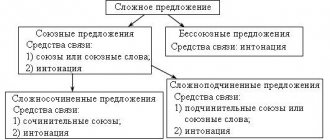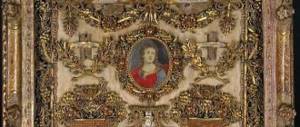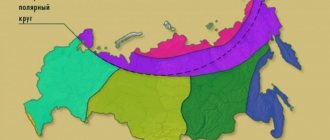Summary of an extracurricular reading lesson at the Dragunsky elementary school
Extracurricular reading lesson by V. Dragunsky “He is alive and glowing”, “The secret always becomes apparent” Purpose: to introduce the biography of V. Dragunsky, some of his works from the book “Deniska’s Stories”, to develop memory, thinking, logic, speech of students, ability to work with text; cultivate moral qualities. Lesson progress: I. Organizational start of the lesson. Everyone, everyone - good afternoon! Get out of the way, you lazy laziness! Don't stop me from studying, Don't stop me from working! Well, guys, keep quiet! The lesson begins. Prepare your ears and eyes so that they can see, hear and remember everything.
II From the biography of the writer (slides 2-10) Viktor Yuzefovich Dragunsky (1913-1972) (slide 2)
Born on November 17, 1913 in New York into a family of emigrants from Belarus. The parents soon returned to their homeland in Belarus and settled in Gomel. (Slide 3)
Victor Dragunsky's childhood and youth were difficult years. At the age of 16, the young man, who dreamed of theater, had to go to work. He worked at a factory, sewed horse harnesses in a saddlery workshop, and transported passengers by boat across the Moscow River. But he nevertheless became an actor and played on stage, not without success. First at the Moscow Transport Theater (now the N.V. Gogol Theater), then at the Satire Theater, the circus, and the Film Actor's Studio Theater. (slide 4)
And in 1935, Viktor Yuzefovich became an actor at the Transport Theater. Viktor Yuzefovich had a wonderful sense of humor. Dragunsky wrote feuilletons, parodies, funny scenes for the stage and circus, and songs. (slide 5)
But most of all, Dragunsky liked to perform in front of children and watch their reaction. He even left the theater to work in the circus as a red-haired clown. (slide 6)
The writer didn’t even have to invent anything. The father in these stories is Viktor Yuzefovich himself, and Deniska is his son. (slides 7-8)
Young readers first met his Deniska Korablev in 1959. And since then, Viktor Dragunsky has firmly established the title of children's writer.
A variety of incidents happened to Dragunsky’s main character: he jumped from a tower into the water, performed on stage (luckily he sang well - loudly!), and got into an accident with his dad. Some of these cases actually happened - not with Deniska Korablev, the literary hero, but with Denis Dragunsky, the son of the writer. True, Denis Dragunsky has grown up, now he is an adult and writes books himself, but Deniska Korablev remains a boy. Victor Dragunsky lived an interesting and varied life. He has not been with us for many years, but Dragunsky’s books are read with pleasure by children and re-read by adults... (slide 11)
III. WORKING ON THE STORY “HE IS ALIVE AND GLOWING” (slide 12)
Has it ever happened to you on a summer evening, when it gets completely dark, to see somewhere in the grass or on the bushes a tiny flashlight that burns with a greenish light? It can burn for a long time, evenly, brightly, sometimes for several evenings in a row in the same place. With its light, you can see the numbers on the clock even in the dark. Who lights this mysterious lantern? This firefly is a very useful bug. It climbs into snail shells and destroys these pests. In the body of a firefly there are special cells with a substance that glows when combined with oxygen. There are many tubes connected to the cells. When the firefly closes them, the cells do not glow. I opened the tubes - air came through them, and the “flashlight” lit up. Beetles with wings are males; their “light bulbs” come on only occasionally and for short periods of time. Wingless females light the lights for a long time and illuminate the darkness of summer nights with them. There are many types of glowing beetles in the world. In tropical countries they are large, fly in swarms among the trees, “flare up” brightly on the leaves, rush up and down, shining with their magic lanterns. SOLVE THE CROSSWORD (IN PAIRS) (slide 13)
Solve the crossword puzzle based on the story
IV. WORK ON THE STORY “THE SECRET ALWAYS BECOMES REVEALED” 1. “The truth always rises above lies, like oil above water.” Miguel Cervantes (slide 14)
• Read with your eyes; • Read slowly out loud; • Read with an affirmative intonation; • Read expressively; • How do you understand the meaning of this statement? 2. Vocabulary work (slide 15)
Secret? Something hidden from others, not known to everyone; Something unsolved, not yet known; The hidden reason for something. Give a synonym for the word secret. Secret Secret ? Secret, hidden, hidden, concealed. Explicit? Open, frank. Chamber of Facets (slide 16)
architectural monument in the Moscow Kremlin, one of the oldest civil buildings in Moscow. Over the centuries, many major events in the life of the Russian state were celebrated in the Faceted Chamber; it was the ceremonial throne room. Foreign ambassadors were received there, the heirs to the Russian throne were solemnly announced, and Zemsky Sobors met. Intelligent (slide 17)
A person with great internal culture. Slander Defamatory information or dissemination of knowingly false information that discredits the honor and dignity of another person or undermines his reputation. Synonyms: Lie, nonsense, invention, slander. Sarcastic? Eager to annoy, maliciously mocking. 3. Working with text (slide 18)
What did Denis once hear from his mother, and how did his mother explain her words? (“The secret becomes clear”) How did mom persuade Deniska to eat porridge? What did she offer him? (Go to the Kremlin) What did Deniska experience when he experimented with porridge? (Feeling of resentment, annoyance) Did Deniska really “lose consciousness” and therefore threw the porridge onto the street? Why does the author use this expression? INTELLIGENCE (slide 19)
What did Deniska do to make the porridge taste better?
spanked with a spoon; salted; sprinkled with sugar; added boiling water; I poured the entire jar of horseradish into the porridge. Which fragment did the artist illustrate? (slides 20-24) b]Practical work Remember the sequence of actions occurring in the text, placing them in order (slide 25)
WHAT THE STORY TEACHES You can’t deceive your parents (slide 26)
Where would you place each proverb in the story? (slide 27) The game does not lead to good things. A gentle word conquers anger. Think first, then act. You can't hold back the wind, you can't hide the truth. After the rain the sun burns, after lies there is shame
Reflection (slide 28) It was interesting... I realized that... I concluded that...
V. WATCHING THE FILM “CHIKI – BRYK” VI. RESULT OF THE LESSON What did the author of these works teach us? What was our attention drawn to?
Presentation on the topic: Extracurricular reading lesson in 2nd grade
We recommend watching:
Literary quiz in elementary school The Ugly Duckling read Bazhov. Read the Silver Hoof Intellectual and literary marathon based on Chukovsky’s book “Doctor Aibolit.” Scenario
Similar articles:
Stories about dad for children
Stories by G. Skrebitsky for schoolchildren
Kazakov “On the spruce stream”
Sakharnov “Octopus on the Rock”
Sakharnov "Pirate Island"


